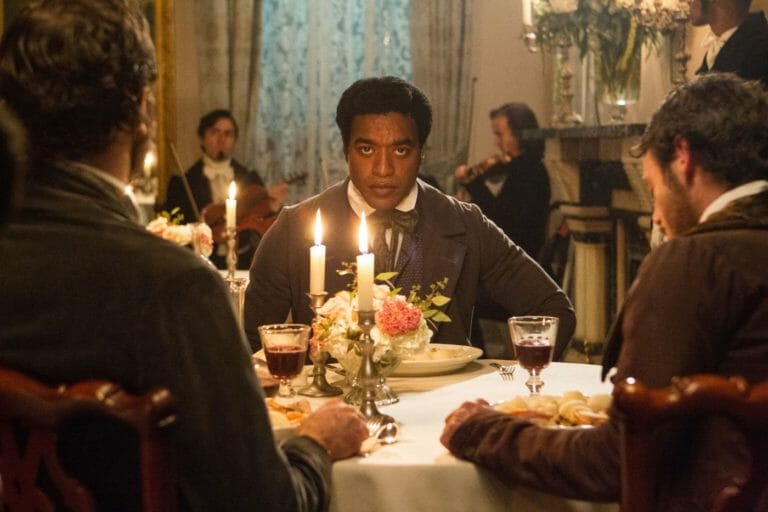By Meredith Alloway · October 17, 2013

I saw this movie twice, just because I’m a crazy person. After seeing a screening in LA and needing a few days to recover, I saw it again at the Hamptons International Film Festival. It’s a meal of a movie. Anything regarding the imprisonment of a people is horrifically heavy. But as much as the film impacted me, I felt I had missed something.
Steve McQueen, who wowed us with Shame, adapted Solomon Northup’s book written in 1853. It’s a huge undertaking given the man has 12 years of slavery to recount. There is so much to mine for when it comes to creating a script. Unlike many biographical movies, which try to cram us into a person’s life while at the same time illustrating their journey and growth, writer John Ridley (Three Kings) keeps it simple.
Solomon, played by an extraordinary Chiwetel Ejiofor, is the vehicle with which we travel. Unlike a traditional character driven story, it isn’t Solomon who drives the plot; it’s slavery itself. This is the missing piece I didn’t get the first time around. I felt the movie lacked emotional payoff. But McQueen wasn’t there to make us feel only for Solomon and his other enslaved companions; he wanted us to connect with the issue as a whole.
Solomon Northup was a free man. He lived with his loving wife and two children in upstate New York. Overnight, he’s shackled and sold into the slave trade. It’s quick enough to make your head spin. He’s told his name is Platt now and never to speak of his true, educated identity. It will only make things worse. Solomon’s first master is Ford (Benedict Cumberbatch). He’s a kind man and has an open ear to Solomon’s knowledge. After Solomon builds a boat to travel the swamps, Ford rewards him with a violin. This treasure is one of Solomon’s most prized skills. But the carpenter Tibeats on the plantation, played by a superbly slimy Paul Dano, gets a little jealous. Soon, Solomon is sold to another master. Ford, as nice as he may be, won’t go far to protect a slave.
Ford seems like an angel next to the demon that is Master Edwin Epps. Michael Fassbender nearly steals the show with his raucous, whisky drenched performance. He’s maniacal in his treatment of his “property.” Solomon is baffled at the way he drools over his prized possession, Patsey (Lupita Nyong’o). McQueen is great at spotting new talent and Nyong’o is surely an actress to watch, her performance being utterly heartbreaking.
Patsey picks the most cotton of anyone and yet Epps is set on raping her any time he pleases. His wife (Sarah Paulson) is furious with his adultery, and seeks revenge by abusing the poor girl. Solomon’s experiences culminate in a horrendous moment, where Patsey’s back is whipped to a bloody pulp. All hope seems lost. These are the moments that plague you long after the film ends.
There is redemption. Solomon is saved, as we all know. His journey is massively tragic but also incredibly full of hope. He often tells his companions that he doesn’t just want to “survive” he wants to “live.” It’s what keeps the film from falling into a black pit.
When a movie like this is made, one wonders why. It’s not because slavery isn’t a pertinent issue; it always will be. Historical films will be made till the end of time and writers will continue to dig for hidden stories. What McQueen saw here, in Solomon’s novel, was something different. It wasn’t only about illustrating a man’s journey. It was about the vignettes he recalls along the way. The film is filled with moments that haunt you. There are gems deep in the dirt of his enslavement that shine light on slavery and what it really was. Nails ripping into a cheek’s flesh; sweat dripping from a brow, white eyes peering in desperation out of an ebony skin. It’s these images that McQueen captures magnificently. One shot in the film lingers on Solomon hanging from a tree for what feels like minutes. On his tiptoes, slipping in the muddy earth, he clings for breath. Behind him, the slaves move about their business. Through this image, it’s clear: it’s every man for himself.
Paul Dano and Adepero Oduye, who plays Eliza, a slave in the movie who looses her children, spoke at the HIFF screening during a Q&A. They were utterly ecstatic and proud of the film. It was refreshing. Paul Dano stressed how important he hopes the film will be. It’s a section of history that textbooks only skim. The images in 12 Years a Slave aren’t printed in a book and taught to students. But Dano encourages that perhaps they should be.